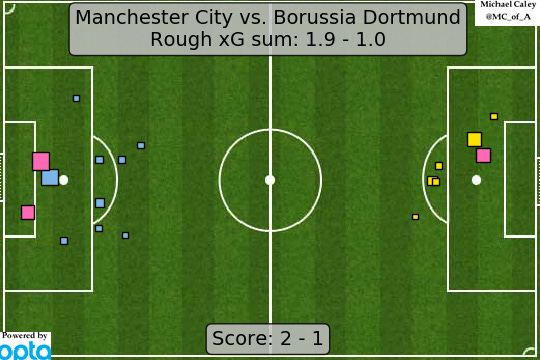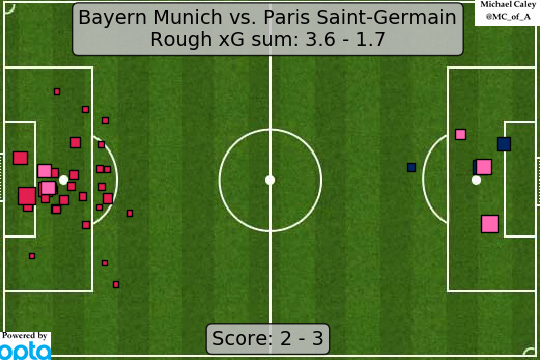Champions League Thoughts
Some notes on what we saw this week.
Since UEFA took the infuriating decision to play two games simultaneously on each night, I’m guessing the majority of you only saw half the Champions League games this week. But don’t despair. I watched all four so you don’t have to! Here’s an overview of what I thought:
Real Madrid 3-1 Liverpool
So I’m kind of in shock at just how easily Real Madrid steamrolled Liverpool.
From the perspective of Jurgen Klopp’s side, this game was just littered with basic errors. Players would give the ball away making five yard passes in midfield. The full backs would get beaten over and over again. It was just shockingly easy from a Real Madrid point of view.
In the first half, Madrid outshot Liverpool 10-01. This was as poor as I’ve seen Liverpool play all season, and while the issues usually stem from Van Dijk’s absence, this time it starts from the front. Diogo Jota didn’t lead the press as effectively as Roberto Firmino typically does, and this then ran through the whole side, totally failing to get tight and close down Madrid’s midfielders on the ball. In possession, three runners meant things didn’t glue together quite so seamlessly.
The change made was Thiago for Keita, and this did help a fair bit to get hold of the ball. The second half shot count was 7-6 in Liverpool’s favour, and that felt about right. A sharp Liverpool are capable of playing at or above Real’s level, even if we didn’t see anything like that in the first half.
The other obvious story was how easily Vinicius dominated Trent Alexander-Arnold. There’s not really a fix for this other than to have the right players covering for him, which didn’t happen and won’t happen in the second leg. Last season he would have Jordan Henderson as the right sided central midfielder and either Joe Gomez or Joel Matip as his centre back. Now, he has Nat Phillips as his centre back, who... yeah, enough said. Keita did such a poor job covering that the sub was in part to move Wijnaldum over to the right side and protect Trent, which he also failed to do.
For Zinedine Zidane, the obvious thing to do is just run it back. Liverpool will surely get tighter to Toni Kroos in the second leg, but using the wide players to pin back Liverpool’s full backs and devastate them on the counter worked a treat. Zidane isn’t famed for his tactical tinkering, so it’d be a surprise to see him change much for the second leg.
This tie isn’t over, but it also feels like a horrible matchup for Liverpool. Madrid to win the second leg on the night and thus obviously go through.
Manchester City 2-1 Borussia Dortmund
Man City have become a pretty relentless machine this season. In the Premier League and Champions League this season, they had given up just 0.69 (nice) expected goals per game. The way they’ve done this has been to slow things way down, become much more patient in the buildup play, sit a little deeper, and use all of this to give up almost nothing. As Ryan O’Hanlon pointed out recently, it’s clear in the data that the Premier League is slower in this Covid-hit season, and City have been slower than anyone. It’s a much more patient game, based on more players carefully passing the ball and fewer breaking forward. It’s worked a treat at congesting areas of the pitch and shrinking the spaces the opponents can find to attack City.
It didn’t work out that way against Borussia Dortmund. They played the conventional strategy of the last few years against City, to allow Pep Guardiola’s side to dominate possession and press in the right moments, winning the ball fairly high up the pitch and creating fast transition opportunities. And this time, it worked. That has to be something of a concern for Guardiola.
City got the win but were fortunate to get away with the referee disallowing Jude Bellingham’s goal. This wasn’t a great result for them, and suggests further problems in the second leg. Guardiola clearly wanted to avoid being drawn into a transition-based game, leaving out all the attacking options who offer direct threat running in behind (Raheem Sterling, Sergio Aguero and Gabriel Jesus) in favour of players who want to come short and involve themselves in the buildup play. Presumably his plan was to control and stifle, which clearly didn’t plan out.
A rethink might be needed, but I’d still back City to get the job done in Germany.
Bayern Munich 2-3 Paris Saint-Germain
There might not have been a better game all season that sums up Covid football. Plenty of good chances, but so little cohesion from two sides with such individual quality.
I’ve posted the xG map, but this feels like a huge game state game. Kylian Mbappe scored with what I think was PSG’s first shot, brilliantly dropping back from an offside position and taking defenders with him, before waiting to pounce. After that, the French side were mostly happy to sit back and hit Bayern on the break. I don’t think they did this particularly well, and it’s obvious Mauricio Pochettino doesn’t have the team playing the way he wants just yet. They scored both of their first two shots, which really should get you home and dry if you’re a serious side. Bayern mostly dominated, running up the xG count, before getting the game level until Mbappe did his thing once more.
It was clear Bayern are a much stronger collective, and I don’t even think they’re all that collectively anyway. PSG were just so... unenthused. I do wonder if Marco Verratti’s absence led to an unduly disconnected side that could pretty much just attack on the counter, but this has also been an issue when I’ve watched them previously this season.
Bayern now have an almighty task, but also ample evidence that they can outplay this PSG side. I’m going to make a slightly bold call and say they pull this one off.
Porto 0-2 Chelsea
Despite the scoreline, I have to say I was disappointed by Chelsea here.
Thomas Tuchel’s side were just really flat throughout. Porto stayed compact and solid for most of the game, which meant the space was out wide. This should have suited Chelsea’s system, but the wing backs Reece James and Ben Chilwell (apart from the goal, yes) seemed very reluctant to really do something with this and push on down the flanks. Would Callum Hudson-Odoi and Marcos Alonso have been better options for this one? I’m not totally sure, but Chelsea certainly needed players willing to bust a gut to get forward more often in the wide areas.
It was a similar story for the front three. All have individual quality, but they felt very isolated from one another. Just take a look at the pass map to see what I mean. Mason Mount, Kai Havertz and Timo Werner barely interacted. Mount obviously provided the bit of individual quality for his goal, but he never really linked with the other two.
With all of the Blues’ attacking options, it’s tempting to say he should’ve started a different front three (I mean, granted they won the game), but this feels like an issue that Tuchel just hasn’t had the time to ingrain the passing patterns he wants. It’ll come.
I feel bad not having more to say about Porto, but they’re almost certainly out now, so who cares. Sorry, Porto fans.
Chelsea are capable of playing with more intensity than this. We’ve seen it under Tuchel. Overall, he seemed overly cautious and static on this one, but I’d expect he’ll make tweaks when they get to the more important semis.
Man, these were a weird set of four games. I really didn’t come out of them thinking more highly of any team in particular. All of them seem to have pretty clear issues to my eyes, but nonetheless, football is football. If I had to put money somewhere, it would be on Man City, but, you know, Pep and all.
Though I wouldn’t be hugely shocked at any of these teams pulling something off. Apart from Porto. I would be shocked if Porto won the Champions League.
Stats here are from FBRef, except the xG maps posted, which are from Michael Caley using Opta data, and the pass map which is from Between the Posts.






